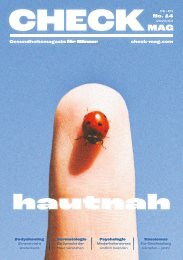CHECK Magazin - Gesundheitsmagazin für Männer No.15
Auf die wissenschaftlich nicht unbegründete Angst, dass der Planet Erde irgendwann für Menschen nicht mehr bewohnbar ist, reagieren die einen mit Widerstand, die anderen mit Ignoranz. Eine null Zukunft steht im Raum, dabei geht das Leben auf jeden Fall weiter. Nach dem Tod kompostieren wir und landen — über viele lange Umwege — vielleicht auf einem Salatteller, den eine (Leih-)Mutter während ihrer Schwangerschaft ißt. Der Punkt ist, dass hier niemand wirklich rauskommt. Warum also gestalten wir uns und den anderen die kurze Zeit nicht so angenehm und gesund wie möglich? Wir haben daher auf eine Sache geschaut, die wir alle gemeinsam haben: Wir altern, hoffentlich mit null Gewalt und Emissionen.
Auf die wissenschaftlich nicht unbegründete Angst, dass der Planet Erde irgendwann für Menschen nicht mehr bewohnbar ist, reagieren die einen mit Widerstand, die anderen mit Ignoranz. Eine null Zukunft steht im Raum, dabei geht das Leben auf jeden Fall weiter. Nach dem Tod kompostieren wir und landen — über viele lange Umwege — vielleicht auf einem Salatteller, den eine (Leih-)Mutter während ihrer Schwangerschaft ißt.
Der Punkt ist, dass hier niemand wirklich rauskommt. Warum also gestalten wir uns und den anderen die kurze Zeit nicht so angenehm und gesund wie möglich? Wir haben daher auf eine Sache geschaut, die wir alle gemeinsam haben: Wir altern, hoffentlich mit null Gewalt
und Emissionen.
Sie wollen auch ein ePaper? Erhöhen Sie die Reichweite Ihrer Titel.
YUMPU macht aus Druck-PDFs automatisch weboptimierte ePaper, die Google liebt.
<strong>CHECK</strong> MAG #15<br />
EMPATHY<br />
EMPATHY<br />
Text: Torsten Schwick<br />
Our empathy is a double-edged sword.<br />
On the one hand, we need it to build<br />
meaningful personal and professional<br />
relationships. On the other hand, it<br />
can lead us to become too involved<br />
in the emotional world of others and<br />
overstepping personal boundaries<br />
— in both directions.<br />
Empathy is not the same as pity or sympathy, with<br />
which one can offer emotional help without being<br />
directly involved. Empathising with another person<br />
is the ability to recognise sensations, emotions,<br />
thoughts, motives and personality traits of another<br />
person, which in turn is accompanied by an imitation<br />
of the other person’s experienced emotional<br />
world. Neuroscience tries to explain this process by<br />
means of so-called mirror neurons, which were<br />
first detected in humans in 2010.<br />
Studies of primate brains have shown that movement<br />
patterns, body signs, posture, facial expressions,<br />
gestures or signals from the other person can<br />
be decoded by our brain as mirror images. Whether<br />
and how these cells influence group behaviour is<br />
still unclear. But we do know that empathy is not<br />
necessarily innate, and that it can be learned and<br />
trained. But why should one do this?<br />
“ We are all born originals — why is<br />
it so many of us die copies? ”<br />
— Edward Young<br />
Real vs. virtual<br />
Sometimes you get the right vibe from another<br />
person, sometimes not at all. With the ability to<br />
interpret facial expressions and body language,<br />
conclusions can be drawn about other people’s<br />
behaviour. If sympathy develops after a conversation,<br />
we also speak of emotional contagion.<br />
This tends to happen with people who are similar<br />
to us in certain characteristics, such as skin colour,<br />
cultural background or educational background.<br />
Community10

















